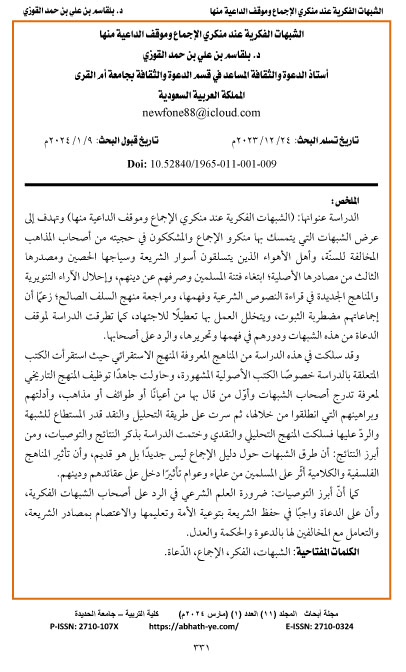The Intellectual Suspicions among Consensus Deniers and the Preacher’s Position towards them
Keywords:
suspicions, thought, consensus, preachersAbstract
The study is entitled: (Intellectual doubts among deniers of consensus and the position of the preacher towards them) and aims to present the suspicions held by those who deny consensus and those who question its authority, among sects contrary to the Sunnah, and people of desires who climb the walls of Sharia law, its fortified fence, and its third source from its original sources, seeking to tempt Muslims and divert them from their religion, introducing illuminati opinions and novel approaches to reading and apprehending legal texts, and reassessing the approach of the righteous predecessors; alleging that their consensuses are disproven, and working on them is interspersed with the disruption of Ijtihad. The study also addressed the position of preachers on these suspicions and their role in understanding and correcting them, and responding to those who raise them.
In this study, I followed the well-known methods of the inductive method, where I extrapolated the books related to the study, especially the famous fundamentalist books, and I tried hard to employ the historical method to find out the progression of those with doubts and the first people who said it, whether notables, sects, or doctrines, and their evidence and proofs from which they proceeded. Then I followed the method of analyzing and criticizing the doubts and responding to them as much as possible, so I followed the analytical and critical approach and concluded the study by mentioning the results and recommendations. Among the most prominent results are: that the techniques of doubting the evidence of consensus are not new, but rather old, and that the influence of philosophical and theological approaches has affected Muslims, both scholars and common people, in a way that has affected their beliefs and religion.
The most prominent recommendations are: the necessity of Sharia knowledge in responding to those with intellectual doubts, and that preachers have a duty to preserve Sharia law by enlightening and educating the nation, adhering to the sources of Sharia law, and dealing with those who violate it with advocacy, wisdom, and justice.

Downloads
Published
How to Cite
Issue
Section
License
Copyright (c) 2024 ِabhath Journal for the Humanities

This work is licensed under a Creative Commons Attribution 4.0 International License.
- البحوث المنشورة في المجلة مرخصة بموجب ترخيص (CC BY 4.0) Creative Commons Attribution 4.0 الدولي.
- تسمح المجلة بإعادة نسخ وتوزيع ونقل العمل لأي وسط أو شكل لأي غرض.
- تسمح بالتعديل والتحويل، والإضافة على العمل مع نسبة ذلك إلى المؤلف.
- حقوق النشر يحتفظ بها الباحثون.




